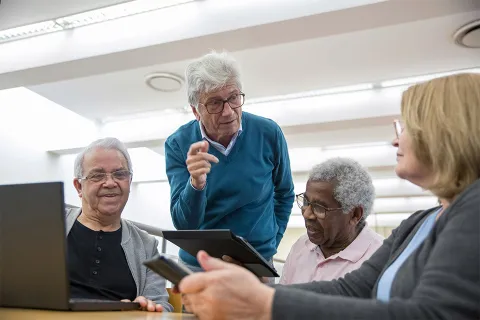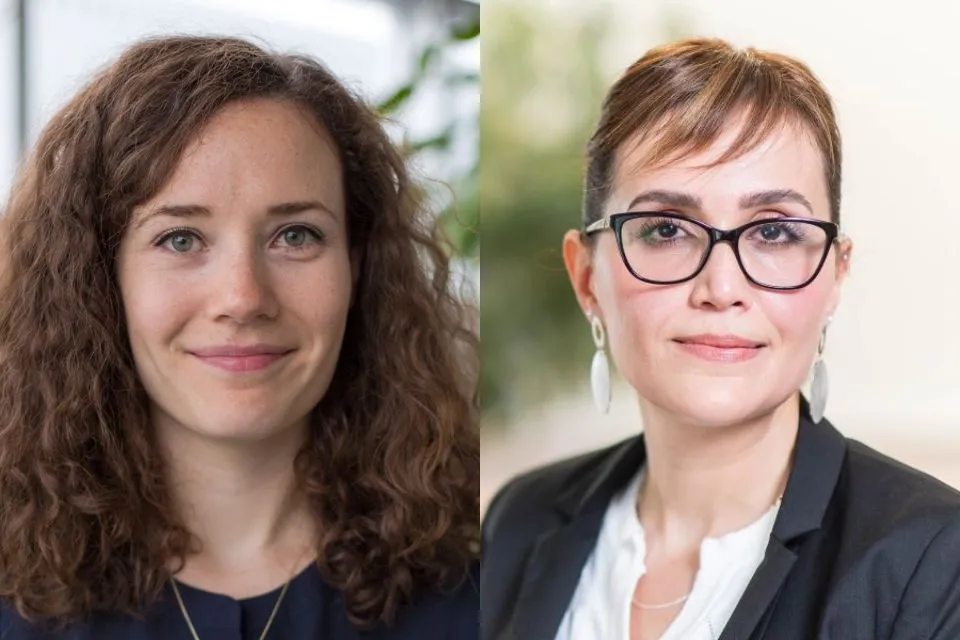UBC Nursing researchers highlight resident and family councils’ impact on long-term care

Two new studies from UBC’s School of Nursing are examining how resident and family councils enhance the experience of long-term care (LTC) home residents.
Backed by the BC Ministry of Health’s residential care regulations, these councils are designed to represent LTC residents’ collective interests, giving them a voice in how their home is run.
The first study, led by UBC postdoctoral researcher Dr. Sheila Novek investigates how these councils encourage participation in decision-making for residents and family carers. The BC phase of this research recently concluded.
A second study, led by Assistant Professor Dr. Farinaz Havaei, examines factors contributing to councils’ effectiveness. The group has produced a short documentary capturing how councils give members a collective voice, and is testing a self-assessment tool for councils to identify their own effectiveness and areas for improvement.
Both teams are collaborating closely with community partners in the LTC sector.

Enhancing resident participation and inclusion
Dr. Novek is studying family councils and resident councils in long-term care homes in BC and Manitoba, focusing on one home in each province. Her goal is to understand how these councils facilitate decision-making participation for residents and family carers, and to enhance inclusivity for residents with dementia.
“While awareness is growing about the contributions of these councils to residents’ wellbeing, there is limited research on how they actually work within long-term care institutions. Our goal is to identify the policies and practices that enable these councils to have an impact,” said Dr. Novek, who collaborates with University of Manitoba researchers.
Preliminary results from the BC study showed that these councils can bring about meaningful changes. For example, the resident council at the BC home focused on improving everyday experiences by modifying the menu, enhancing outdoor recreational spaces, and making elevators more wheelchair accessible.
The family council advocated for introductory packs and information resources for new residents' families, as well as end-of-life care information.
"Our goal is to identify the policies and practices that enable these councils to have an impact."
Despite these promising developments, resident councils in particular face barriers to accessing information.
“In 2022, the BC Ministry of Health updated long-term care regulations and strengthened the role of resident and family councils, publishing guidelines to support them. At our study site, family council leaders were well-informed about the new regulations and guidelines, but resident council members were not. Residents wanted more information about their rights, the councils’ purpose, and opportunities to connect with other councils. We need to provide accessible information tailored to residents,” said Dr. Novek.
Dr. Alison Phinney, who supervised the work, emphasized the importance of family and resident councils in identifying emerging issues. “Each long-term care home is unique and faces challenges that external experts might miss. Residents have a right to influence their home environment and address system-level issues.”
Dr. Phinney’s research focuses on the social inclusion of people with dementia, and this study is a critical part of that work. The next stage will focus on councils in Manitoba, with preliminary results expected in early 2025.
“We often view long-term care residents as passive recipients of care, but these councils challenge that perception. They remind us that many residents have valuable insights and a desire to make a difference,” said Dr. Novek.
Short film and a self-assessment tool
Showing long-term care residents and their loved ones that they have the power to create change is what Dr. Havaei wanted to capture in “Raise Your Voice.”
The seven-minute film interviews residents, family members, operators and researchers about how a resident and family council works—and how an effective council acts as a platform for people to share lived experiences, create solutions, and participate in care home decision-making.
“Resident and family councils are essential for a healthy long-term care home,” said Dr. Havaei, founder and director of the UBC HOPE Lab. “Our research during the pandemic shows that when residents and family members lack a process to express concerns, this can lead to devastating impacts for everyone within the LTC community.”
The film also features resources from the Independent Long-Term Care Councils Association of BC (ILTCCABC) for those interested in starting their own councils, or for councils looking to participate in discussions at the regional and provincial level.
“We invite resident and family councils to attend regional meetings in their health authority. Regional associations meet as a provincial group and that’s where systemic issues and ideas for improvement get elevated to our Ministry of Health,” said Lisa Dawson, vice-president of ILTCCABC. “This collaborative mechanism of raising our collective voice in long-term care aims to improve the system for everyone.”
The film is a result of research into the experiences of LTC residents, families, operators and advocates to identify key factors that contribute to a council’s effectiveness.
Dr. Havaei and her doctoral student Sabina Staempfli translated their findings into a pilot council effectiveness tool that councils can use to self-assess and determine where change is needed.
“Resident and family councils are essential for a healthy long-term care home.”
Dr. Havaei and her collaborators are now sharing the film and self-assessment tool with LTC homes and health authorities in BC, so that they can more effectively communicate with and support council requests. (In BC, LTC homes are required to provide administrative support and an opportunity to meet regularly with councils.)
With greater uptake of the tool, Dr. Havaei hopes to establish a provincial baseline and compare the effectiveness of councils in different long-term care homes—large or small, rural or urban, public or private—across BC.
“We recognize that many people in the health-care system want to support resident and family councils to function as well as possible, but don’t know how best to do that,” said Dr. Havaei. “Now we are offering something that can help.”



